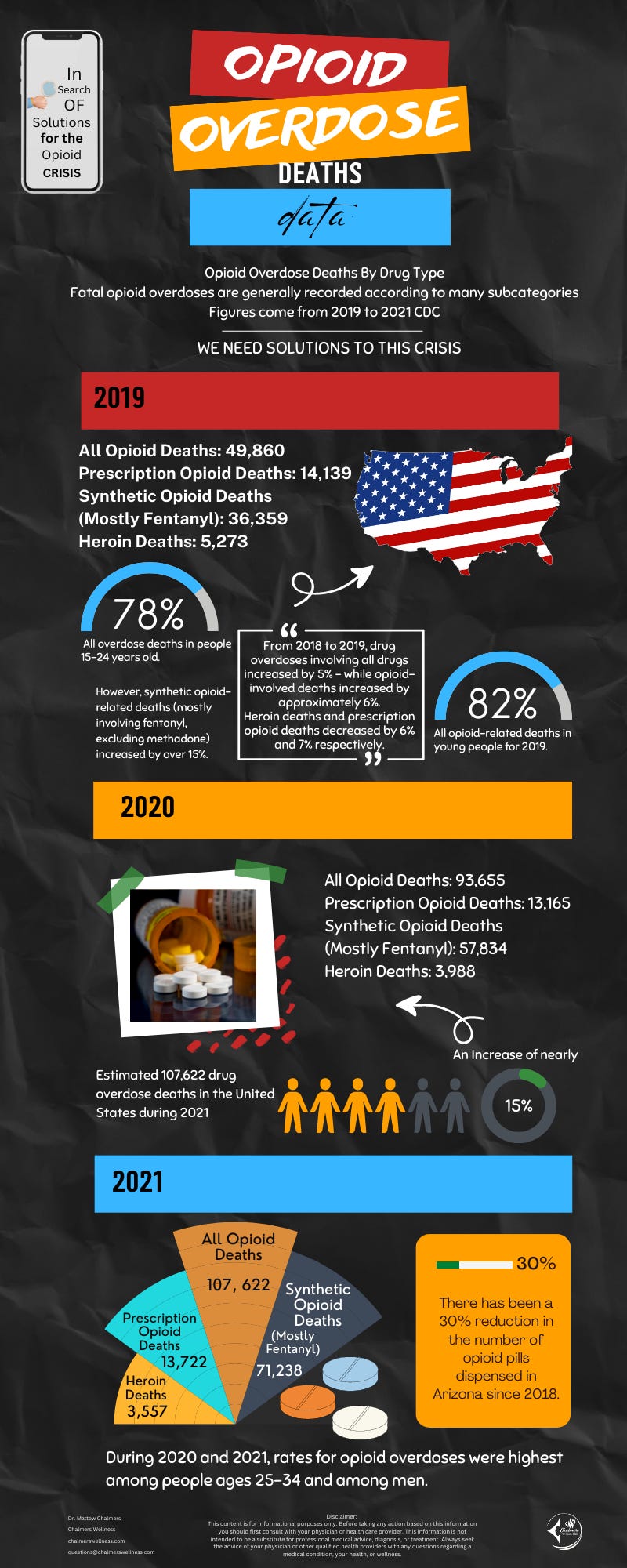This article is the sixth article in the series where I address the medical benefits of cannabis and its potential to make a difference in the opioid crisis. When I started my research, I was not prepared for the potential impact on the opioid crisis.
When you have this type of information and technology, how do you tell the world? I chose to do a TEDx talk. So, in a few weeks, the TEDx talk will be released. Early in February, I got on stage and presented the idea of using prescription cannabis instead of opioids for pain. I have also agreed to start doing TV news interviews about it.
So, as I look out at the possibilities of exchanging cannabis for opioids, I recognize that with the research we have of cannabis possibly replacing opioids 64% of the time, I am left to wonder if we could reduce the new addiction numbers by 64%. If you do the math from 2018-2022, we added 1 million people to the list of addicted.
That considers those that have already died. That means that even with the 50,000 people that died in 2019 and the 70,000 people that died in 2020, those 120,000 people not being counted as addicted, the number still increased by over a million.
One million people over four years are close to 21,000 new people per month being added to the addicted list. In case you're wondering, 64% of 21,000 people is, 13,440 people not addicted monthly, or 645,120 people over four years.
There are some downsides to cannabis, as I mentioned earlier. However, the rate of significant life-altering addiction and death is not one of them. I am not saying that cannabis is the best solution we will ever have. However, it is a solution to the problem we currently have. I hope we can see it for the many life-saving positive aspects it currently holds.

The previous 5 articles in the series are listed below.
What is the difference between opioids and cannabis? You would be surprised what the research shows.
What is the psychological stance on using cannabis for pain relief?
Research matters in discussions around cannabis, and medical uses. What do you think?
What do you think about cannabis? Well, my opinions have changed through additional research.
Stay tuned for my TEDx talk coming out in a few weeks. Addressing the opioid addiction is a huge issue in the United States, and together we can make a difference.
Check out Chalmers Pillarsofwellness.com for Wellness updates! And ask me any questions you have at questions@chalmerswellness.com. I answer all of them and look forward to hearing from you.
The Chalmers Wellness Stubstack just launched. Comment, Like, Interact with other people on their wellness journey. Communities can make the difference. DrChalmers.substack.com

Dr. Matt Chalmers
Disclaimer: This content is for informational purposes only. Before taking any action based on this information you should first consult with your physician or health care provider. This information is not intended to be a substitute for professional medical advice, diagnosis, or treatment. Always seek the advice of your physician or other qualified health providers with any questions regarding a medical condition, your health, or wellness.
Shows via MRI that CBR1 in the amygdala (attenuate) suppress anger and fear. Thus, decreasing anxiety
https://www.ncbi.nlm.nih.gov/pmc/articles/PMC2657360/
Same study different write up. Shows suppression of BL amygdala
https://www.ncbi.nlm.nih.gov/pmc/articles/PMC4360235/
Again referencing the same study same conclusion
https://www.ncbi.nlm.nih.gov/pmc/articles/PMC2841401/
Showed that baso-lateral specifically R lateral activation of the amygdala helped suppress the feelings of pain and thus decreased the reported subjective pain felt.
https://www.ncbi.nlm.nih.gov/pmc/articles/PMC3549497/
Activating the 5 HT1 receptors in the BLA can suppress the learned failure response and thus reduce future anxiety. Viewing anxiety as perceived failure (conditioned defeat) in the future that holds fear now as if you are living in the failure at the moment. The 5 HT1 receptors help increase serotonin levels to the cleft.
https://www.ncbi.nlm.nih.gov/pmc/articles/PMC3242817/
More on 5 HT1 receptors
Showing that Delta 8 is just as effective with less side effects as medications already on the market.
https://pubmed.ncbi.nlm.nih.gov/34797727/
Cannabis
Showing that cannabis greatly reduced pain and the only real issue was cost and stigma. Reduced opioid use by 64% with a 17% reduction in opioid fatalities.
https://www.ncbi.nlm.nih.gov/books/NBK574562/ (5)
Many of the studies showing negative effects of cannabis on pain were set up to fail. Cannabis has been shown to be better than codeine
https://www.ncbi.nlm.nih.gov/books/NBK224384/
Pretty solid overview of how the receptors CBR1 work and where they are. The evidence that CBR1 is almost entirely inhibitory to neuronal tissue is pretty apparent. This widespread systemic placement of ligand based and cytoplastic receptor function that again is inhibitory shows a cannabinoid specific and dose dependent functionality of cannabis all over the body save the upper brainstem where the breathing center is. Activation of CBR1 greatly reduces excitotoxicity and reduces glutamate which by itself could stop seizure activity.
This also demonstrates significant protection against oxygen deprivation and reperfusion so the benefit to concussion and all oxygen deprivation function like epilepsy, and Parkinson's where oxygen deprivation is a significant issue especially from sleep apnea issues.
https://www.ncbi.nlm.nih.gov/pmc/articles/PMC5877694/
Showing that the medulla has a low amount of CB1 receptors
https://onlinelibrary.wiley.com/doi/10.1111/j.1365-2826.2008.01671.x (6)
Opioid issues:
https://www.addictionresource.net/opioids/overdose-deaths/
https://pubmed.ncbi.nlm.nih.gov/35105535/
https://www.ncbi.nlm.nih.gov/books/NBK553166/
Nearly 70k deaths in 2020
https://www.cdc.gov/drugoverdose/deaths/index.html (2)
Death rate of 2019 just under 50k
https://www.aha.org/news/headline/2020-07-16-cdc-drug-overdose-deaths-46-2019 (1)
More info government numbers
https://www.hhs.gov/opioids/about-the-epidemic/opioid-crisis-statistics/index.html
More death numbers with graphs and age delineation
https://nida.nih.gov/research-topics/trends-statistics/overdose-death-rates
Estimated 2 million Americans are addicted to opioids 2018
https://psychiatry.org/news-room/news-releases/nearly-one-in-three-people-know-someone-addicted-t (3)
Nearly 3 million Americans addicted in 2022
Opioid receptors in the pons:
https://pubmed.ncbi.nlm.nih.gov/22747535/
https://www.ncbi.nlm.nih.gov/pmc/articles/PMC3545180/
https://www.ncbi.nlm.nih.gov/pmc/articles/PMC2642894/
Opioid vs cannabis overdose
https://www.ncbi.nlm.nih.gov/pmc/articles/PMC6135562/
https://www.ncbi.nlm.nih.gov/pmc/articles/PMC4392651/
https://pubmed.ncbi.nlm.nih.gov/33367882/
https://www.ncbi.nlm.nih.gov/pmc/articles/PMC5563007/
https://www.ncbi.nlm.nih.gov/pmc/articles/PMC4392651/
Deaths from cannabis
https://pubmed.ncbi.nlm.nih.gov/32370933/
Many of these studies look like they are trying to blame cannabis. The sidney study showed that of men with Aids that smoke cannabis they still died of Aids. They are somehow trying to tie the cannabis to Aids deaths its from 1997.
https://www.ncbi.nlm.nih.gov/books/NBK425742/
Also many of the deaths that are attributed to cannabis are not solely or even closely related to cannabis. Many of them are motor vehicle accidents, most 47% had high levels of alcohol, and many of the deaths were suicide, while still others had other drugs in the system. It is very hard to find cannabis deaths where only cannabis was involved.
Cannabis and blood pressure
This area of research is very odd as there is evidence that cannabis lowers blood pressure when they gave it to people that already had high blood pressure. However, from a we looked at people that used cannabis and we saw higher blood pressure they also mention that the people in the study also used a lot more alcohol. I lean on the study where they already had the BP issue and cannabis helped. Again the mixing of other substances, drugs or alcohol, makes many of these studies useless.
https://www.ncbi.nlm.nih.gov/pmc/articles/PMC5237375/
https://pubmed.ncbi.nlm.nih.gov/33483174/
Reducing the amount of opioids via coadministration of cannabis shows promise
https://www.ncbi.nlm.nih.gov/pmc/articles/PMC6135562/
Anxiety and cannabis
Shows that cannabis is a solid choice for anxiety from a prescription point.
https://www.ncbi.nlm.nih.gov/pmc/articles/PMC4604171/





